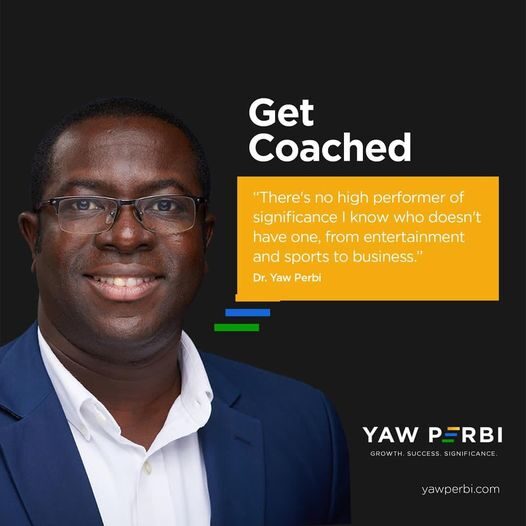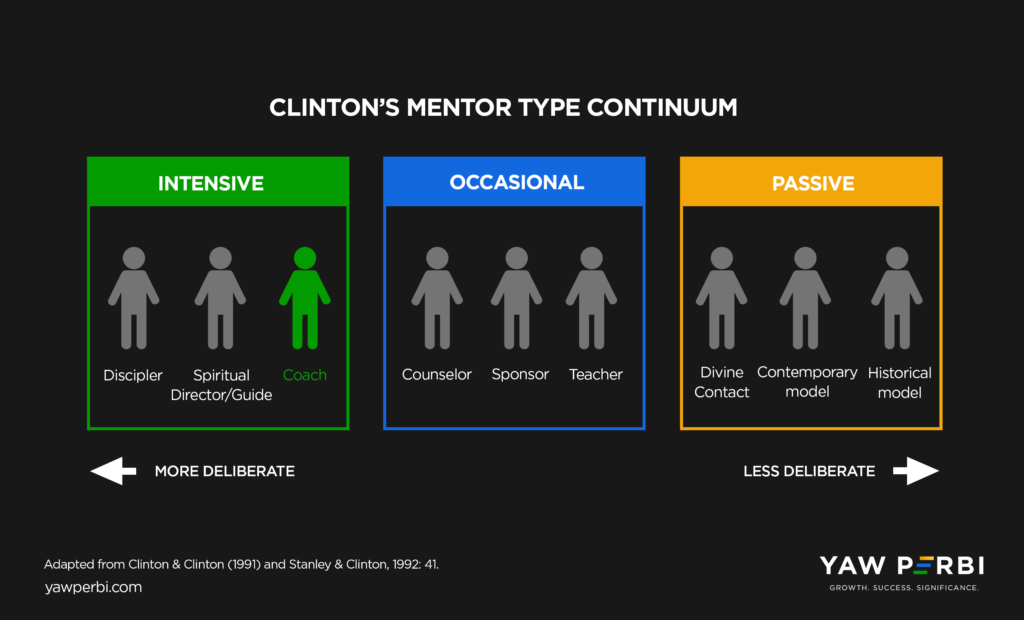There is no significant high performer I know who doesn’t have a coach, from entertainment and sports to business. Some have even more than one. How about you?
It was just a one-hour call with a coach. Let’s call him Joe. It changed the trajectory of my life. It wasn’t at a corner office in downtown Montreal or in one of the new plush buildings decorating the Accra skyline. It was at home, just at home; over Zoom. But utilizing the major tool coaches employ–questions, questions and more questions–the lightbulb suddenly came on and within 24 hours I had the oomph to re-start passive income generating projects I had kept procrastinating for a decade! How much that call with Joe cost me in dollars cannot be compared with the kind of lifetime value I gained and lifelong income stream I am cued to earn. I love the CLARITY coaches help bring to our thinking.
SO WHAT IS COACHING?
One of the most (ab)used words in our time is ‘mentor’ or ‘mentoring’ (or ‘mentorship’). I’ve heard and read people actually say coaching and mentoring are two different things. But no, mentoring is a term for the broader framework of empowering relationships every successful person needs (see diagram above) and coaching is a form of mentoring.
According to one of my leadership professors (during my Master of Arts in Global Leadership), mentoring is “a relational process in which a mentor, who knows or has experienced something, transfers that something (resources of wisdom, information, experience, confidence, insight, relationships, status etc.) to a mentoree, at an appropriate time and manner, so that it facilitates development or empowerment” (Clinton & Stanley 1992, 40). Mentoring is relationship, relationship, relationship. A relational experience, relational process, relational exchange.
Coaching, therefore (I repeat), is a form of mentoring, as is all the other eight types of mentoring shown in the Clinton Continuum diagram above.
WHAT MAKES COACHING DIFFERENT?
First of all, you will notice that coaching is classified among the first third of relationships under ‘INTENSIVE’, unlike counselor, teacher and sponsor (grouped in the middle third) which are OCCASIONAL experiences. For example, as a coach, I recommend at least twice a month meetings with my coachees; sometimes even weekly (depending on their situation, needs and goals) for a minimum of six months. The ideal is a contact every 10 days especially so that no balls are dropped inadvertently.
While the scope of this write-up is not to describe every one of the nine mentoring relationships but to highlight coaching in particular, let me briefly say that a discipler is someone who enables another in the basics of following a religion (especially Christianity), a spiritual guide provides accountability, direction and insight for questions and decisions affecting spirituality and maturity. A coach provides motivation, clarity, challenge, accountability, skills and application needed to meet a goal. Clinton would argue that “the coach’s central thrust is to provide motivation and impart skills and application to meet a task or challenge” (73). Coaching, he would say, “is a process of imparting encouragement and skills to succeed in a task through a relationship” (76).
THE NITTY-GRITTIES
Coaching is an on-going conversation where I (as your coach) provide encouragement, guidance and honest feedback, as YOU pursue YOUR personal and professional goals. I fully expect you to grow yourself and your family/business/organization and succeed in life, by attaining your goals!
There is no significant high performer I know who doesn’t have a coach, from entertainment and sports to business. Without a coach, it is hard for anyone to experience high performance on their own, let alone to achieve what has come to be known as meta performance. In today’s competitive environment, some of the most successful business leaders have experienced tremendous benefits from coaching. Results have included increased revenue and productivity, career advancement, higher employee retention, and the development of more effective business strategies. YOU will define the agenda. YOUR results will vary depending on how long we work together and what actions YOU take.
As a John C. Maxwell trained and certified coach, my clients are expected to, and have experienced, measurable return on investment, increased productivity, and up to 200% revenue growth.
IT WORKS! LET ME HELP YOU.
If I didn’t believe this stuff, I wouldn’t be promoting it. The proof of our belief in anything is our investment of time and money in it. I personally have my own coach who I pay hundred of dollars to for three sessions monthly. At YAW PERBI, our value proposition is authentically empowering C-level executives for exponential growth in 90 days, success within a year and significance for a lifetime (and beyond). Try me. Try us.
We are human, thus limited, and cannot help everybody. Currently I personally have only 10 places each year for authentic, high quality and deep relationship one-on-one coaching so I have had to make the hard decision to focus mainly on C-level executives. The wisdom in that is, as my mentor John Maxwell says about what he calls “the Law of the Lid,” when they get better (raise their lids), everyone else else under them gets better. Knowing how key coaching is, however, no one will ever be turned away. I would be more than happy to refer you to others within my very rich coaching network. Everyone deserves a competent and caring coach.
Apart from one-on-ones, there are times I do one-on-few coaching for a group of executives. My favourite is helping executives work through company DNA (vision, mission & values)! I’ll share about that in a later blog.
If you’re ready to grow, succeed and be significant, take my hand and let me help you. Let me be your coach.
Bibliography
Clinton, J. Robert and Paul D Stanley. 1992. Connecting: the mentoring relationships you need to succeed in life. Colorado Springs: NavPress.



